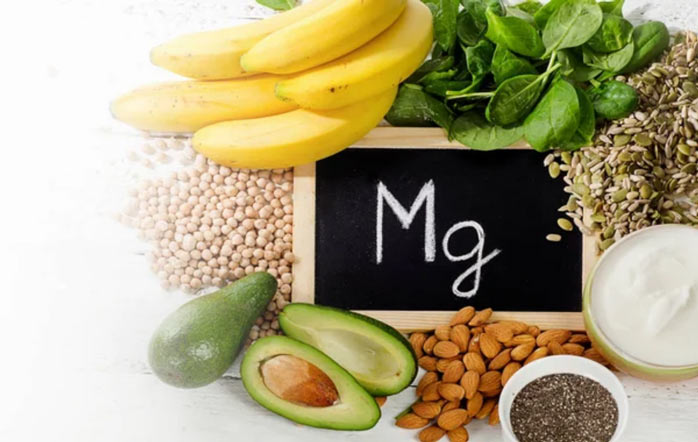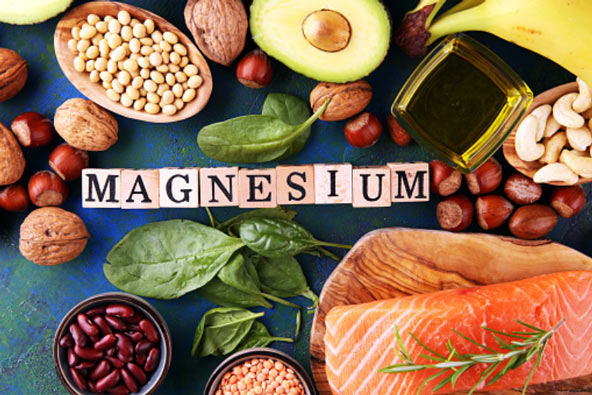Magnesium-rich foods should be at the top of your list if you're looking for foods to boost your health. Magnesium is vital for many bodily functions, and its importance in maintaining healthy levels can't be understated. Fortunately, many delicious and nourishing sources of nutrients are available today.
From nuts and whole grains to leafy greens, legumes, seafood, and more - whatever type of food you love eating can include magnesium if prepared correctly. We will explore some key benefits of consuming magnesium-rich foods and list which types contain high amounts so that you can easily add them daily.
Magnesium

Magnesium is a mineral found in our bodies and the environment. It is essential for many processes within the body, including energy production, muscle contractions, nerve transmission, protein synthesis, DNA replication, and more.
Magnesium also helps regulate blood pressure levels and aids in maintaining healthy bones. It also plays a role in insulin sensitivity, which helps keep blood sugar levels stable.
Benefits Of Magnesium to Health

- Supports Healthy Bones – Magnesium helps to build and maintain strong bones by stimulating calcium absorption. It also helps to prevent bone-related diseases such as osteoporosis.
- Reduced Anxiety – The mineral has been found to help reduce anxiety and stress levels in humans and animals, making it a great nutrient for relaxation.
- Improved Heart Health – Magnesium helps to keep the heart healthy by improving circulation and reducing high blood pressure levels. It also reduces the risk of cardiovascular disease, stroke, and heart attack.
- Pain Relief– Magnesium plays a role in decreasing inflammation throughout the body, which can help alleviate pain due to migraines, muscle tension, joint pain, and more.
- Improved Sleep Quality – Magnesium is known to relax the body and mind, which can help improve sleep quality and duration.
- Healthy Blood Sugar Levels– Magnesium helps regulate insulin sensitivity, allowing for better blood sugar control. This can reduce the risk of diabetes and other related diseases.
- Protein Synthesis – The mineral aids in protein synthesis, allowing our bodies to use amino acids from food sources more effectively. This can help increase muscle mass as well as overall health benefits.
- Improved Mental Health – Research suggests that magnesium may be beneficial for improving mental health by reducing symptoms of depression and anxiety disorders.
- Enhanced Digestion – Magnesium helps digestion by aiding enzyme activity and nutrient absorption. It helps to prevent constipation and other digestive issues.
Drawbacks Of Magnesium to Health
- Diarrhea: Too much magnesium can cause diarrhea, as it acts like a laxative.
- Low Blood Pressure: High doses of magnesium can lower blood pressure to dangerously low levels, so it’s important to avoid taking more than recommended amounts.
- Heart Blockage: Magnesium can lead to heart blockage when taken in excessive quantities over a long period because calcium deposits can build up on artery walls and cause blockages.
- Interference with Medication: Certain medications should not be taken while consuming high levels of magnesium, such as antibiotics and antacids, as they may interfere with how the body absorbs the drugs.
- Kidney Stones: Too much magnesium can lead to kidney stones since the mineral is eliminated through urine, and too much in the body can cause an overload of minerals in the kidneys.
- Muscle Weakness: Magnesium deficiency can lead to muscle weakness as it plays a role in nerve transmission and muscle contractions.
- Low Vitamin D Levels: High intakes of magnesium can reduce vitamin D levels, which can be detrimental to bone health. Therefore, consuming the right amount of both nutrients is essential for optimal health.
These are some potential drawbacks to consider when adding large amounts of magnesium to your diet; these are some potential drawbacks. As always, Whenore is making any changes or taking dietary supplements.
Magnesium-Rich Foods
Now that you know the benefits of magnesium for your health, here are some delicious and nutritious sources of the mineral to include in your diet:
- Nuts – Almonds, cashews, walnuts, brazil nuts, and more all contain high amounts of magnesium.
- Legumes – Beans, peas, lentils, soybeans, chickpeas - are excellent sources of magnesium, protein, and fiber.
- Whole Grains – Oats, quinoa, brown rice - these whole grains provide plenty of magnesium and other vitamins and minerals.
- Leafy Greens – Spinach, kale, collards, chard - are some of the most nutrient-dense foods on the planet and are all magnesium-rich.
- Fish – Salmon, tuna, mackerel - these fatty fish contain high levels of omega-3 fatty acids and plenty of magnesium.
- Pumpkin, sesame, and chia seeds are all rich in minerals like magnesium and zinc to support your overall health.
- Fruits – Bananas, dried apricots, avocados - these fruits provide both a tasty treat and a good dose of magnesium at the same time.
- Dark Chocolate – Who doesn’t love a square of dark chocolate every once in a while? It turns out that dark chocolate is also packed with magnesium to help you get your daily dose.
How to Know if You're Getting Enough Magnesium
It is recommended that most adults get between 310 and 420 milligrams of magnesium daily. To ensure you’re getting enough, you must include plenty of magnesium-rich foods in your diet.
Supplements can be taken if needed. It’s also important to note that some medications may interfere with magnesium absorption into the body, so always consult a doctor before taking any new supplement or medication.
Suppose you experience any signs of magnesium deficiency, such as muscle cramps, fatigue, anxiety, or difficulty sleeping. In that case, speaking with a healthcare provider as soon as possible is important for further evaluation and treatment recommendations.
By getting enough magnesium in your diet and lifestyle, you will be able to enjoy all of the health benefits this vital mineral offers.
FAQS
What is the highest natural source of magnesium?
The highest natural magnesium source is dark leafy greens such as spinach, kale, and Swiss chard. Other foods with high levels of magnesium include nuts, legumes, whole grains, fish, seeds, and certain fruits like bananas and avocados.
What causes a lack of magnesium?
Several things, including inadequate intake of food sources rich in minerals, excessive alcohol consumption, certain medications, and medical conditions such as diabetes or kidney disease, can cause a lack of magnesium. Some people may be genetically predisposed to not absorbing enough magnesium from their diet.
How can I check my magnesium levels?
A simple blood test is the best way to check your magnesium levels. Your healthcare provider can order this test, and it will provide an accurate reading of how much magnesium you have in your body. If the test shows you are deficient, your doctor may recommend lifestyle changes and dietary adjustments or supplements to help meet your needs.
Conclusion
Making the right dietary choices by including magnesium-rich foods can benefit your health and well-being. From leafy greens, legumes, whole grains, and even a few unusual food sources, plenty of options out there contain high levels of magnesium. By getting your daily recommended dosage of magnesium and incorporating it into your diet in a balanced way, you will reap the positive benefits of consuming this vital mineral.




